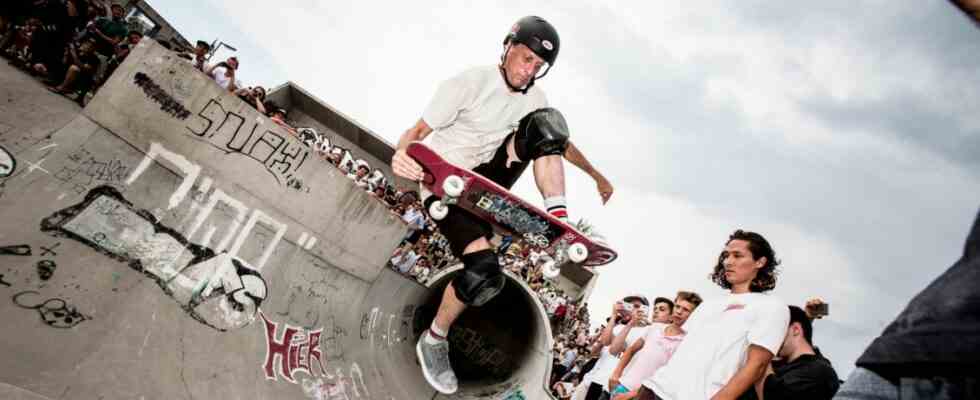Ouch. What Tony Hawk is doing to himself must really hurt. The greatest skater of all time is now 54 years old, no one has ever earned more money from skateboarding, no skater has shaped the sport as much as he has. At this moment, when he is lying like a battered deer at the lowest point of the halfpipe, this proud sportsman’s life doesn’t matter. It doesn’t matter how many times Hawk has done that trick, the 720 (two full spins in the air) he’s failing and failing and failing at right now. It doesn’t matter how much the body demands a break, sweats, pumps. There seems to be only one certainty in Hawk’s mind: he undershot the 720 at least once. Either he lands it now – or he keeps trying until the ambulance picks him up.
Good keyword, ambulance, at one point in the two-hour documentary Tony Hawk: “Until the Wheels Fall Off” Hawk lists what he has already done to his body in his 40-year career. A selection: He broke his elbow, knocked out several teeth at least five times, his ankles are irretrievably tattered. Dozens of concussions (only a few with amnesia, after all), countless whiplash injuries. And yet he doesn’t stop, maybe he can’t stop. Tony Hawk is a driven soul who by his late teens was so lonely at the top of his sport that competing against himself became more exciting than competing against his rivals. This competition has only one problem: it doesn’t end. “I’m still trying to push my limits. I don’t know for how long, but I’m not going to stop,” says Hawk.
Hawk became a legend, a rock star – and was unhappy
This inner struggle lashed Hawk into the history books of the sport. For decades, skaters whispered to each other that a two-and-a-half spin in the air, a 900, should theoretically be possible. Many tried, all failed. Until Tony Hawk just kept trying at the 1999 X Games in San Francisco. Several times he slid down the ramp on his knee pads and not on the board, with a maniacally concentrated look he threw himself try after try into the halfpipe while thousands went crazy around him – and then: a man of gravity finally wrestled the for the first time ever 900 from.
“Until the Wheels Fall Off” shows the footage from back then and then lets Tony Hawk, his family and the who’s who of the skater generation of the time comment on this moment. A classic pattern of documentary film. Thanks to interesting interlocutors such as legend Rodney Mullen or Hawk’s “discoverer” Stacy Peralta, this formulaic sequence never gets boring.
At the latest this 900 moment made Hawk himself a legend. And skating became a mass phenomenon again. “Suddenly we were rock stars,” he recalls – and because rock stars are touring, Hawk put on an arena-filling show with motorcycles, skaters and music, to the locations of which he traveled by private jet. He lent his name to a video game developer who has now released 19 games under the name “Tony Hawk’s Pro Skater”. Youngsters were skating again – they all knew “the best”, Tony Hawk.
“I didn’t start skating to be famous,” says Hawk in the documentary, which progresses through his life quite chronologically – and at some point just reaches the point when Hawk’s career has reached the top on the outside. Huge fame, how’s that? “It’s the worst drug,” says Hawk. “I didn’t like myself, I didn’t like the choices I made.” Above all, the fact that he had neglected his son at the time hurt him. “I didn’t know how I could be a husband, a father I could be proud of.” Then he bucks upright in his chair, lowers his eyes and fiddles with his shirt. This is how Hawk reacts when something gets too personal for him. It happens a few times in the film, it’s the strongest moments.
A shy man then sits there, who would probably like to quickly skateboard to the next halfpipe. There he would then try to land that damn trick, the 720, one more time. Just one more time. Until he makes it. Or have to go to the hospital.
Tony Hawk: Until the Wheels Fall Off (2022), 124 minutes, directed and produced by Sam Jones, edited by Greg Finton, on wowtv.de.

